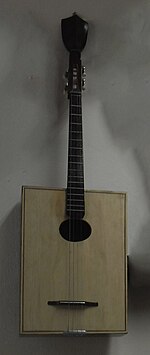Đàn tứ

Modern Đàn tứ with rectangular body and longer neck
The đàn tứ (tứ meaning "four" in Sino-Vietnamese, referring to the instrument's number of strings), also called đàn đoản (đoản meaning "short," referring to the instrument's neck), is a traditional Vietnamese stringed musical instrument, this is a square box lute with a short neck, similar to the guitar or ukulele. It is little used today.[1][2]
A different instrument with the same name, which is similar to the Chinese zhongruan, is used in Vietnam's tradition of nhạc dân tộc cải biên. About 1960s, Vietnamese musician improved đàn tứ's ability to play Western-style music by creating a rectangular body with longer strings designed for Western Diatonic scale. It now becomes much more popular than the traditional version.
References[]
- ^ ATLAS of Plucked Instruments
- ^ "Instruments". Lac Hong. Retrieved 7 August 2012.
Categories:
- Lute family instruments
- String instruments
- Vietnamese musical instruments
- Lute stubs